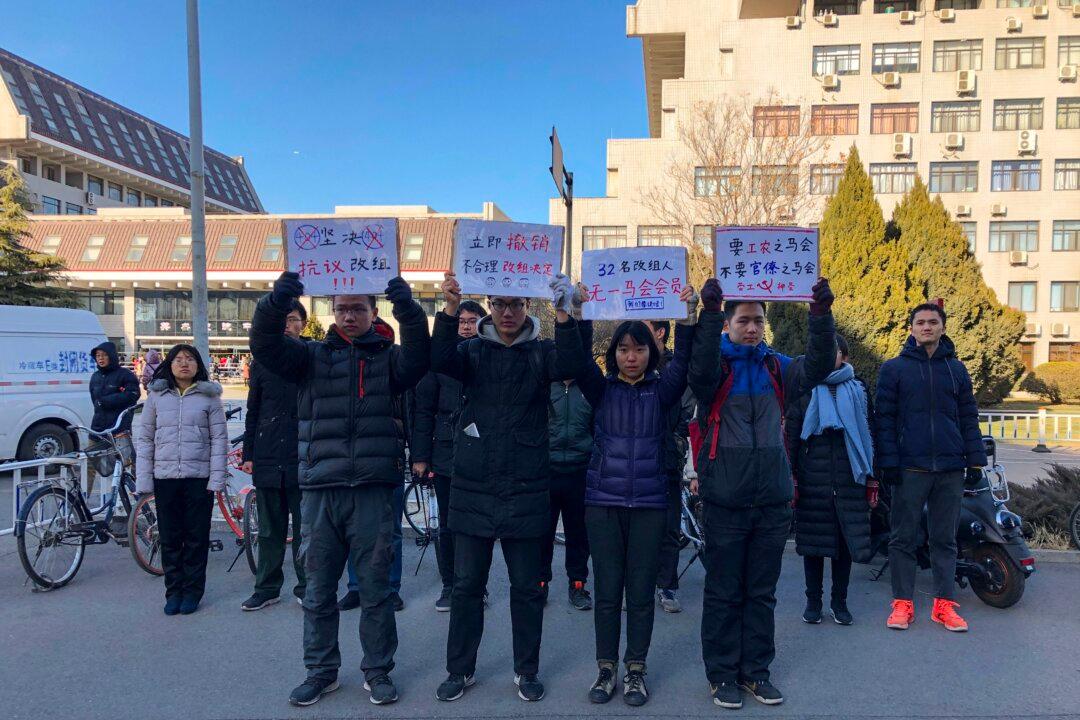Within an hour, police rushed at the group and dragged them into a nearby building, where, barricaded in classrooms, they were shown videos of recent graduates, including one from their own university, “confessing” to working with an “illegal organization” to arrange protests in southern China, students involved told Reuters.
On Jan. 21, a solidarity group that has been calling for the activists to be released posted online statements decrying the videos as “slander.”
Friends of the activists told Reuters that the videos distorted facts and were an attempt to threaten those who have been calling for the release of dozens who have been detained since August.
Chinese authorities have in recent years made increasing use of video “confessions” to seize the public narrative in politically charged cases and to make an example of those detained as a warning to others, rights groups say.
A Peking University spokeswoman declined to comment due to the university currently being on winter break. China’s Public Security Ministry did not reply to a faxed request for comment.
The videos shown to the students last month focus on events in July 2018, when Chinese police quashed protests by workers from a welding equipment manufacturer in the southern city of Shenzhen who wanted to form a labor union with leaders of their choice.
Around 50 students and activists from across China had flocked to support the workers, sparking waves of further detentions that spread to China’s top university campuses, including Peking University, informally known as Beida.
The videos featured four activists in their 20s, all recent graduates, saying that they had spread “false information,” founded organizations that intended to “overthrow” the government and worked in concert with foreign media.
Shen Mengyu, Zheng Yongming and Gu Jiayue—all of whom had supported workers at Jasic International, the welding equipment firm—said they had been assigned by an unnamed “organization” to organize the worker protests.
Yue Xin, a Beida graduate who first made headlines in April 2018 for her vocal #MeToo activism, said that the Shenzhen protests had been “politically motivated” and created a “negative impact on society.”
Yue also renounced her earlier efforts, inspired by the global #MeToo movement, to force Beida to divulge information about a decades-old rape case.
“At the time people placed too much importance on public disclosure,” she says in the video, according to students who have seen the clip, adding that “foreign forces fixated with China’s bad side” had exploited this desire to “provoke troubles.”
“Invert Black and White”
The versions of events given by the activists in the video are radically different from how close friends recall the incidents described, four of them told Reuters, declining to be named for fear of reprisals from the authorities.“There has been no news of these classmates since they went missing in August. No one, whether family or lawyers, has been allowed to see them. Where they are being held, what they have suffered, we don’t have a clue,” one of the friends said.
The reference in the videos to an “illegal organization” that orchestrated the protests was an attempt to “invert black and white,” given it was the workers’ protests that drew activist support, not the other way around, the same source said.
“The left-wing students and the support group’s actions are guided by Marxism, are answering Chairman Xi Jinping’s call and are in line with Socialist ideas,” another said, referring to Xi’s calls for China to stick with Marxist theories.
Tool of “Terror”
Gu and Zheng are being held in a form of detention known as “residential surveillance at a designated location,” or RSDL, according to notices sent to their families and seen by students.The controversial measure allows police to interrogate suspects for six months without legal representation and is meant to be reserved for severe crimes such as “endangering national security,” “terrorism” or serious bribery crimes.
Rights groups say that the lack of oversight gives police carte blanche in their interrogations, allowing torture and forced confessions, including those that can then be publicly released.
China aired nearly 50 such confessions between 2013 and 2018, according to RSDL Monitor, a group run by Madrid-based rights activist Peter Dahlin, who featured in one such video himself, aired by China’s state broadcaster in 2016.
People who are asked to make confession videos tends to have been detained for some time, and have often been physically or mentally tortured, Dahlin told Reuters.
Under RSDL, he was held in solitary confinement, denied sleep and interrogated for about six hours per day, according to a book Dahlin wrote about China’s use of “confessions.”
After three weeks, he provided a scripted “interview” to state broadcaster journalists to try and speed up his release and that of his Chinese girlfriend, he wrote.
“These ‘confession’ videos not only serve a more generic propaganda purpose, they tend to be aimed as tools of political terror, using one or a few people to create fear in their larger communities,” Dahlin said in an interview.
China’s Foreign Ministry said in 2016 that Dahlin had pleaded guilty to crimes of endangering national security and was expelled from China in accordance with Chinese law.
Chinese state media has defended RSDL as being necessary to ensure that legal procedures “proceed smoothly” in complicated or sensitive cases.





